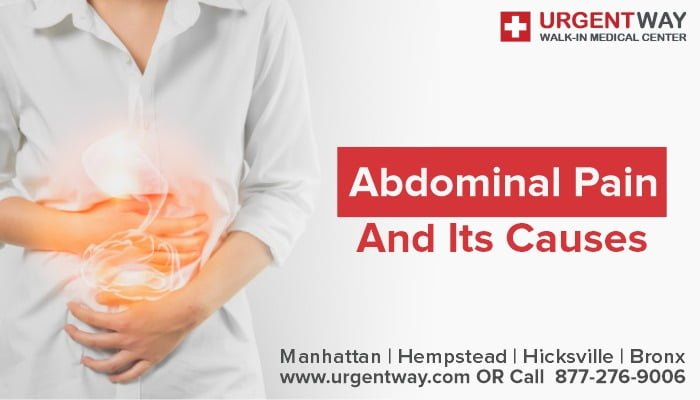The pain that occurs between the chest and pelvic region is known as abdominal pain. Abdominal pain can be of many types as cramps, achy, dull, sharp, and intermittent. Infection or disease of all the organs situated in the abdomen can be the cause of abdominal pain or stomach ache. Several reasons can lead to abdominal pain like infection, inflammation, obstruction, and intestinal disorder. The throat infection can also disturb the digestive tract, resulting in abdominal pain. The location of the abdominal pain indicates its cause.
Causes Of Abdominal Pain:
General Causes
Some general causes that may lead to the pain in any zone of the abdomen such as:
- Bloody stools
- Black Terry stools
- Lack of urination
- Dehydration
- Abrupt cessation of bowel movement
Different zones of abdominal pain have different causes, as given below:
Causes Of Lower Abdominal Pain
Lower abdominal pain occurs due to having:
- Appendices
- Intestinal obstruction
- Ectopic pregnancy
Causes Of Central Abdominal Pain
Central abdominal pain occurs due to having:
- Appendices
- Internal injury
- Uraemia
- Gastroenteritis
Causes Of Upper Abdominal Pain
Upper abdominal pain can occur due to having:
- Gallstones
- Heart attack
- Hepatitis
- Pneumonia
- Liver inflammation
Causes Of Lower Left Abdominal Pain
Abdominal pain in the lower left side can occur due to having:
- Crohn’s disease
- Cancer
- Kidney infection
- Ovarian cysts
- Appendices
Causes Of Upper Left Abdominal Pain
Abdominal pain in the upper left side can occur due to having:
- Cancer
- Spleen
- Kidney stones
- Faecal impaction
- Enlarged spleen
- Heart attack
Causes Of Lower Right Abdominal Pain
Abdominal pain in the lower right side can occur due to experiencing:
- Flu
- Cancer
- Kidney infection
- Hernia
- Appendices
Causes Of Upper Right Abdominal Pain
Abdominal pain in the upper right side can occur due to experiencing:
- Hepatitis
- Injury
- Pneumonia
- Appendices
Symptoms Of Abdominal Pain
These are the following symptoms that are associated with abdominal discomfort or pain:
- Bleating
- Belching
- Diarrhoea
- Heartburn
- Constipation
- Indigestion
- GARD
- Gas
- Pelvic discomfort
Diagnosis Of Abdominal Pain
The underlying cause of abdominal pain can be diagnosed by following tests and ways:
1) Physical Examination
During the physical examination, the doctor observes the sounds coming from the intestines, signs of inflammation, and mass in any abdomen zone by touching the different zones of the abdomen.
2) Laboratory Tests
The following laboratory tests help doctors to diagnose the underlying causes of abdominal pain:
- Complete blood count test
- Level of liver enzymes
- Level of pancreatic enzymes such as amylase and lipase
- Pregnancy test to determine the position of the infant
- Urinalysis test
- Plain X-ray also helps to determine the amounts of fluids and air in the intestines
3) Radiographic Diagnosis Approaches
Following radiographic tests also helps to diagnose the causes of abdominal pain:
- Ultrasound
- Computerized tomography
- Magnetic resonance imaging
- Barium X-Ray
- Capsule enterostomy
- Electrocardiogram
Treatment Of Abdominal Pain
Treatment of abdominal pain depends on the underlying cause and duration of pain. If the abdominal pain is for a short period and mostly occurs after having a meal, it shows an unhealthy diet. This condition requires a healthy diet. If the pain is persistent and severe then it requires specific medications and sometimes requires surgery to treat it. The following treatment methods can relieve abdominal pain:
1) Self-Care Measures
Most of the time, digestive discomforts are causes of abdominal pain so, these self-care measures can be helpful as:
- Avoiding solid and salty food
- Sipping clear and filtered water
- Avoid dairy products and citrus food
- Resting under you feel better
- Walk at least for 10-15 minutes after having food
2) Medication Option
We shouldn’t take aspirin, ibuprofen, or other medicines without a doctor’s prescription because they can cause irritation in the stomach and increase pain. Doctors, after determining the underlaying cause, can prescribe the following medications:
- Antibiotics to treat infections
- Drugs to reduce inflammation
- Medications to treat gastroesophageal reflux disease
- Drugs to manage the inflammatory bowel disease
3) Surgeries
Sometimes, the underlying cause can’t be treated without surgery. So, for those conditions, surgery or specific procedures are required to treat them as:
- Injection of a numbing agent
- Corticosteroids injections
- Hernia repair surgery
- Appendectomy
Abdominal pain causes discomfort between the chest and pelvic region. There are different causes of abdominal pains in a specific region of the abdomen. The location of pain and severity of the abdominal pain indicates the underlying cause of abdominal pain. Different symptoms associated with abdominal pain also help us to recognize the cause of the pain. Various diagnosis methods are used to determine the cause of abdominal pain and its specific location in the abdomen. Various treatment methods are available to treat abdominal pain, but treatment method depends on the location, cause, and severity of abdominal pain. Some self-care measures can be taken to relieve the abdominal pain and to start the specific treatment for that cause.


